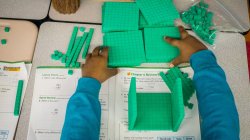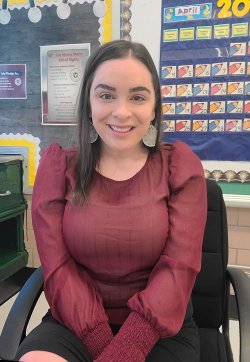What STEM Innovation Fellows Learned During COVID-19
Math teachers count on each other to help navigate a complicated school year
Posted in: Education, Science and Technology

With its focus on reshaping the way math is taught in elementary school, the New Jersey STEM Innovation Fellowship provided an important lesson during the course of the coronavirus pandemic – the support teachers have for one another is something they can count on.
That’s been the experience of Racheal Safier, a teacher in Newark, New Jersey, who earned her Master of Arts in Teaching in 2014 and graduated in June with a second master’s degree in Educational Leadership from Montclair State.
As one of 30 New Jersey teachers selected for the fellowship modeled after Math For America, Safier says the teachers were engaged in a teaching innovation known as number strings to help students develop their own big ideas about mathematics when COVID-19 upended the last school year.
“When the pandemic hit, many of us got sent home and we had to figure out this whole remote teaching situation,” Safier says. The fellowship program’s meetings also moved online, pivoting from tips on best classroom practices to the virtual tools teachers were using at different grade levels for teaching and learning.
The support was essential in helping the teachers discover new ways to help their students be successful, says Safier, a graduate of the Newark-Montclair Urban Teacher Residency and an academic interventionist, providing extra help for students in reading or math in the lower grades, at Luis Muñoz Marín Elementary School in Newark.
Associate Professor of Mathematics Eileen Murray, who is on leave to serve as director of Strategic Initiatives at Math for America (part of her work is to help elevate Black, Indigenous and people of color in STEM), says the pandemic prompted the fellowship to broaden its goals by providing support in remote learning.
“The feedback from the teachers is that they feel so much better and calmer knowing that others are going through the same thing,” Murray says. “It’s been powerful being in a community in a time of crisis.”

PRISM (Professional Resources in Science and Mathematics) at Montclair State University is partnering with Math for America, Princeton University and Rowan University to offer the NJ STEM Innovation Fellowship, a teacher leader program for New Jersey K-5 math teachers. Launched in 2019, participants are selected through a rigorous application process and receive a stipend.
“It’s all about having that community of teachers who are interested in reflecting on their practice and getting better and best serving their students,” Safier says.
According to Jennifer Robinson, executive director of the Center of Pedagogy and an Urban Teacher Residency principal investigator, “I think Rachel and this program understand a basic principle in education: We do not learn in isolation, we learn in community. When groups of teachers come together to learn from each other, deeper learning can happen for them and for their students.”
Story by Staff Writer Marilyn Joyce Lehren
You May Also Like:
